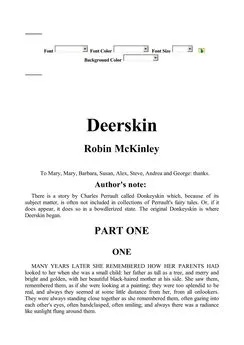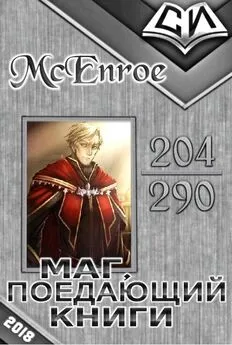Deerskin - Robin McKinley
- Название:Robin McKinley
- Автор:
- Жанр:
- Издательство:неизвестно
- Год:неизвестен
- ISBN:нет данных
- Рейтинг:
- Избранное:Добавить в избранное
-
Отзывы:
-
Ваша оценка:
Deerskin - Robin McKinley краткое содержание
Robin McKinley - читать онлайн бесплатно полную версию (весь текст целиком)
Интервал:
Закладка:
She wished the rumble of conversation around her would diminish that she might hear what was said around the dais. It was not that the voices of those she wanted to listen to were so far away or so soft; it was that she could not distinguish one voice from the next. She could only listen to all of them at once and therefore understand nothing. This was a knack, she thought, one that she had perhaps had in her old life; it would come back to her. Meanwhile she took in, without wanting to, the tale of the old woman behind her and her sickly only son, and the tale of the old woman with her, whose previous husband had come back from the dead, as she had supposed, and not to wish ill upon the living since it now seemed he was living, but she had liked him better dead, for he was a ne'er-do-well and her second husband suited her much better, and she wished to keep him. These voices fell the nearest upon her ear, and she could not turn her listening away from them.
Ash had stayed quietly at her side, pressed up against her, her wide brown eyes moving quickly, her fleethound's muscles vibrating faintly at all the tempting or dubious shadows and sudden bursts of motion; but she was no longer a puppy, and not only her own dignity but her person's demanded she stay where she was.
As the crowd before her thinned, Lissar could see the folk on the dais more clearly. She liked the queen's brightness of eye, the king's ready smile; she Jiked that bath of them were quietly dressed (not all of their court were so modest); she liked that they seemed to speak no more than was necessary. She liked that neither of them was handsome.
The young man to the queen's left was handsome. His hair was thick and curly, his eyes large and brilliant, his lashes long, his hands slender and graceful: Lissar could see the women, young and old, look at him when they went to address the king and queen; and they looked long and longingly. The young man looked back, smiling, without arrogance, but with a kind of selfconsciousness that Lissar did not like. He rarely spoke, and then only if the king or queen spoke to him first.
The princess was not beautiful in the common way, but she drew the eye and then held it. There was something about her, as if she were always poised on the brink of doing something surprising and wonderful; an air as if she too believed she were about to do something surprising and wonderful. Sitting so close to the beautiful young man neither put her out of her composure, nor put her in the shade of his more predictable beauty. She, too, spoke only when the queen or king addressed her first, but she looked searchingly at every supplicant, and her clear face said that she had opinions about everything she heard, and that it was her proud duty to think out those opinions, and make them responsible and coherent.
The prince spoke as little as possible, and there were long pauses before his answers, if a question was addressed to him. But she noticed that everyone, including the king and queen, paid sharp attention when he did speak, and her impression was that his words on more than one occasion had significant influence on the outcome of the particular situation under discussion. This was, she thought, reassuring, as there was so little at all princely in his demeanor.
He was probably tall, though it was difficult to be sure, for he hung in his chair as if he rested on the middle of his spine instead of his pelvis; and he sprawled over one arm of the chair as well, his head negligently propped on one fist. His hair, though thick, was inclined to be lank, his eyes were a little too small, his nose a little too square, his chin a little too large-as was his waistline. His hands were big and broad, and either of his boots looked long enough for a yerig to den in. As she was thinking this, he uncrossed one leg from the other and stomped that foot on the floor; she startled, as if he had known what she was thinking, and her involuntary movement, for some reason, among all the gaudy motion of the court, caught his eye.
It was almost her turn; perhaps he had been looking her way already, searching longingly for the end of the queue, the end of this afternoon's work. He looked, and his gaze paused. She knew what he saw: a black-eyed, white-haired woman in a white deerskin dress; she was an exotic figure, enough taller than the average that she stood out even before the oddity of her clothing (and bare feet) might be remarked.
And she was growing accustomed to the way other people seemed to leave a little space around her; it was no different from her feeling separate from the rest of humanity, though she had no name for what the separation meant or was made of.
And, whatever the truth of it was, she was glad to be spared the closest proximity of the crowd. Then the woman ahead of her stepped forward, and Lissar stood next in line, and the prince saw Ash.
He straightened up in his chair then, and she saw that he was tall; she also saw that he was capable of enthusiasm, and not so sluggish as she would first have guessed. His eyes brightened, and he shoved his hair back from his forehead. He was paying no attention whatsoever to the woman now telling her story.
With his motion, two long narrow heads rose from behind his chair; or rather, the one she had already noticed rose as the dog sat up, and a second head appeared around the shoulder of the first. One was fawn-colored, a little more golden than the silvery Ash; the other was brindle, with a white streak over its muzzle, continuing down its chin, throat and chest. The two looked first in response to their master's interest, and then they, too, saw Ash. Ash went rigid under Lissar's hand.
The king and queen said something to the woman before them, and she bowed, slowly and deeply, and made her way to the door all the supplicants left by, different from the one they had entered, a smaller and simpler door, as if exiting was a much easier, less complex and less dangerous matter than was the feat of going in in the first place. It was Lissar's turn, and she had heard nothing of what had just occurred between the woman next to her in line and the king and queen, for she had been distracted by the prince and his dogs. Now she had to go forward without the reassurance of seeing someone else do it first. She walked forward.
The prince's eyes were on her dog, the king's on her dress, and the queen's on her feet. She did not notice where the handsome young man's eyes rested, or the princess's, or if perhaps they might have found her too dismaying an object to look at straight at all. Her bare feet were silent on the glossy floors, against which even the softest shoes were liable to tap or click; Ash's nails were well worn down from the many leagues she had travelled with her person, and so she too made no sound.
Lissar felt that the whole court had fallen silent though she knew this was not true; but a little bubble of silence did enclose the dais. The two dogs rose fully to their feet and came to stand by the prince's chair; an almost negligent wave of his big square hand, however, and they stopped where they were, although their tails and ears were up. Ash was Lissar's shadow, and she stopped when Lissar stopped, but Lissar kept her hand on her shoulder, just to reinforce her position. She bowed, still touching her dog.
"Welcome to the yellow city," said the king in a friendly voice. "I say welcome, for I have not seen you before, and I like to think that I see most of my subjects more than once in their lifetimes. New you are at least to this our city, I think."
"Yes, your greatness, and to your country as well; and so I thank you for your greeting." Lissar hesitated, uncertain how to proceed. "I-I was told that you would hear anyone who presented herself to you. I-have little to present. But I-think I would like to stay here, if I could, and so I need work."
"What can you do?" said the prince, not unkindly. The handsome young man laughed, just a little, gently, and at that moment Lissar decided she disliked him. Her eyes moved in his direction and she noticed the princess sitting straitly on her bench, and thought that for the moment she did not look poised, but stiff, as if her backbone had turned to iron. She thought, The princess does not like the handsome young Cum of Dorl either: but what does she think of her brother?
She looked at the prince as she answered honestly: "I do not know what I can do." She did not know what inspired her to add: "But I like dogs."
"Where is yours from?" said the prince. "If it were not for her long coat, I would say she is a line of my breeding."
"Ossin," said the king.
The prince smiled, unabashed, and shrugged, as if to say that a dog was a dog and he could not help himself. The Cum of Dorl made a little, catlike wriggle in his chair, and for a moment his beautiful profile presented itself to Lissar, and out of the corner of her eye she caught the curl of his lip; but she remained facing the prince.
The humor faded from Ossin's face and now she realized that he looked tired and sad, and that the droop of his shoulders as he slumped forward again was of a weary burden. He said softly, "One of my best bitches died this morning. She left a litter of puppies a few hours old. The pups haven't a hope unless they are nursed most carefully; they probably haven't a hope even with nursing, but I dislike giving up without a struggle-and their mother was a very special dog. There are eight of them. If any survive it will have been worth almost any price to me. Would you care to play wet-nurse? It will be disgusting work, you know; they'll be sick at both ends right up through weaning time, most likely, if any should live so long, and you won't get much sleep at first."
"I will do it," said Lissar, "but you will have to teach me how."
TWENTY
THAT WAS THE END OF HER AUDIENCE; SHE BOWED, AND IF SHE did not include the Cum in her courtesy, she doubted that anyone noticed but herself.
The prince spoke a few words to a servant, who came to Lissar, bowed himself, and said, "If the lady will follow me." Lissar thought to bow again to the dais because the servant did; somewhere she recalled that one always bows last thing before leaving the royal presence, even if one has already bowed several times previously.
Somehow she remembered this from the wrong angle, as if she were sitting on the dais.... She followed the servant, leaning a little on Ash as a brief wash of dizziness assailed her.
The servant led her to a small antechamber off a vast hall similar to the one she had entered by. She sat down when the man bowed her to a chair, but she was not comfortable, and as soon as he left the room she stood up again, and paced back and forth. Ash remained sitting next to the chair with her chin propped on its seat but she kept an eye and an ear toward Lissar. Lissar was thinking, I have been in the wilds too long, this great building oppresses me. Why do I remember sitting while someone bows to me? I am an herbalist's apprentice-an herbalist's apprentice who has lost most of her memory to a fever she was not clever enough to cure herself of.
And yet her own thought rang strangely in her head, for a voice very like the one that had spoken to her on the mountain, the voice that had left her without guidance since she and Ash had come down from the wild lands, said, It is not that you have been in the wilderness too long. But this brought her no comfort; instead she felt angry, that she was permitted to understand so little; that even her own mind and memory spoke warily, behind barricades, to each other, without trust; that her guiding voice was not to be relied on, but spoke like an oracle, in riddles that she must spend her time and thought to unravel, to little effect.
Читать дальшеИнтервал:
Закладка:








![Makenlo - Маг, Поедающий Книги. Главы 101-203 [некоммерческий перевод с корейского]](/books/1101097/makenlo-mag-poedayuchij-knigi-glavy-101.webp)

